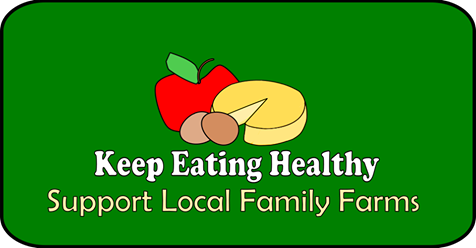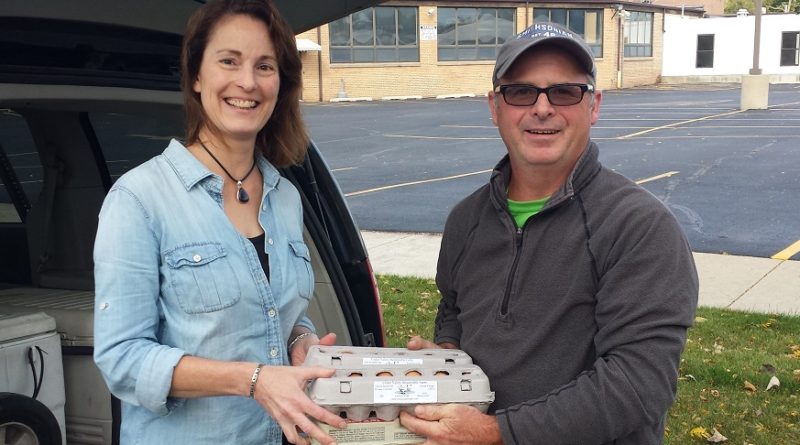Keep Eating Healthy and Grow Some Food Yourself
Podcast: Play in new window | Download (Duration: 1:33:31 — 42.1MB)
Subscribe: Apple Podcasts | Spotify | Android | iHeartRadio | Podchaser | Email | TuneIn | RSS | More
(April 5, 2020) Today we will be talking about our brand spanking new Keep Eating Healthy campaign. We’re going to try to help you and your local farmers connect so you can have fresh food and they can stay in business. Pretty simple, isn’t it? That happens in the second hour.
Skip to a specific segment in today’s podcast here.
8:02 Lisa Hilgenberg from Chicago Botanic Garden
38:59 Scott Jamieson from Bartlett Tree Experts
57:41 Jody Osmund, Leslie Cooperband and Melissa Flynn
1:25:09 Meteorologist Rick DiMaio
Let’s start with a scenario.
Suppose you were in charge of 50,000 fruit and vegetable plants and your business shut down because of a pandemic. Oh, I don’t know, let’s say it was because of a coronavirus. Let’s say that you normally required the help of a couple of dozen volunteers to keep those plants healthy. And let’s say that you still needed to keep those plants going, because you never know when a pandemic is going to end. What would you do?
That’s the dilemma faced by Lisa Hilgenberg.
As the horticulturist at the Chicago Botanic Garden’s four-acre Regenstein Fruit & Vegetable Garden, Lisa leads a crew of four and a team of 25 volunteers in curating and interpreting a collection of 500 types of edible plants. Using USDA protocol and standards for organic growing, the plants grown in 2018 produced a harvest of two tons of fresh fruits and vegetables. Lisa designs three seasons’ worth of vegetable display beds, manages two orchards of apples and stone fruits, and mentors interns from Windy City Harvest (the Garden’s urban agriculture program), College First (Chicago Public Schools), and the French Heritage Society.
Lisa is a regular on the show and joins us via Zoom this morning. We’ll ask her about how this year’s mission has changed at the Chicago Botanic Garden. Even better, she’ll help get you started with your own backyard veggies.
Essential care for your trees during the COVID-19 crisis
If you’re a fruit grower, you can keep eating healthy by keeping your trees healthy. However, most folks don’t count on their trees for food. Does that mean we can leave them to their own devices during the pandemic? Well, yes and no.
You might be interested to know that landscaping has been declared an “essential service” during this crisis. On March 23, the Illinois Landscape Contractors Association wrote about Illinois Governor J.B. Pritzker’s”Stay-at-Home” order. They noted that the order allows for the continued operation of essential businesses only. Lawn and landscape services are essential services and permissible under Section 12. Paragraph H. of the Executive Order. Here’s more.
Although landscaping is not mentioned by name, landscape services were verified as essential by the Illinois Department of Commerce and Economic Activity on March 23, 2020. They released an FAQ document on essential businesses that reads:
Can residential and commercial lawn service remain open? Yes. Many landscape projects will fit under an exemption such as construction, agriculture, or public works. Outdoor landscape projects generally will provide for good social distancing that poses little risk of transmission, but it still is important to ensure the ability to wash or sanitize hands and take other precautions.
That’s where our major sponsor, Bartlett Tree Experts comes in. Here’s how they’ve responded to the COVID-19 outbreak.
Since our business plays a critical role in maintaining the integrity of landscapes, we have been working closely with governments and within our industry to ensure we can perform our essential services. As an approved essential service, we have, and will continue to, protect trees and shrubs and help ensure safe landscapes at homes and businesses. This includes critical tree services and helping to prevent the spread of invasive plant insects and disease.
While performing this work, we are more conscious than ever of the role safety plays in our interactions with each other and with our clients. From climbing trees to using saws and heavy equipment, safety has always been at the very core of the work we do. Now, that also means maintaining safe, social distancing and stringent sanitation practices.
Scott Jamieson is Vice President and Midwest Division Manager at Bartlett. He is part of their crew that regularly appears on our show. He wrote to me a couple of weeks ago.
Currently, as Illinois goes into lockdown, we will continue to operate for those clients needing “essential services” on their trees. This will include storm damage, hazard tree removal, deadwood removal that may endanger the public, treatments to trees that if not made timely made lead to the death of the tree, etc. Of course, all of our tree work is not “essential” per what we assume will be state order coming out shortly. We do know, however, during this time clients have welcomed us on their properties (at a distance) and have keen interest in taking care their trees while they are “nesting” and also giving them a sense of normalcy.
Scott joins us on the show this morning to talk more about what you should consider “essential” work on your trees and how to get it done.
Keep Eating Healthy–a campaign and a good idea
I hardly know where to start when it comes to reporting on the COVID-19 crisis and local food. There are a lot of resources out there and we are doing our best to pass along links and other connections. One thing we do know is that a paradigm shift is happening, perhaps temporary, perhaps permanent.
In a very short time, COVID-19 has virtually upended the food system. And for farmers who sell directly into local markets, it has made the in-person sales they depend on—usually facilitated at farmers’ markets, restaurants, schools, and other communal places—especially unsteady.
As peak harvest season approaches, growers have been scrambling to move their sales online, where orders can be fulfilled without face-to-face interaction, either for through traditional community supported agriculture (CSA) boxes or other creative models. At the same time, groups that support local food economies have also been working to direct consumers to these new systems so that they can continue to buy local food from home.
 We’re aware of that here at The Mike Nowak Show with Peggy Malecki. So, we’ve started our own campaign to help small farmers weather the storm. It’s called Keep Eating Healthy, and it’s really nothing more than an effort to connect small, local farmers with consumers.
We’re aware of that here at The Mike Nowak Show with Peggy Malecki. So, we’ve started our own campaign to help small farmers weather the storm. It’s called Keep Eating Healthy, and it’s really nothing more than an effort to connect small, local farmers with consumers.
Basically, we’re asking local food providers to sign on to the campaign. We’ll promote them through our show advertising and social media. We will charge them very little to be part of the effort. In fact, if they see no sales through The Mike Nowak Show, they will owe us nothing. Period.
If you’re a consumer, you’re responsibility is to buy a CSA share or take part in a delivery service or drop off. Not only are you supporting your local small farm, you’ll be eating healthy produce. And you’ll be keeping us on the air, too. I almost never talk about this, but I pay to keep The Mike Nowak Show with Peggy on the air. Radio ain’t what it used to be.
On today’s show, we welcome Jody Osmund from Cedar Valley Sustainable Farm CSA, located in Jody and his wife Beth are friends of the show and both of them have been on the program. Their website explains that
Community Supported Agriculture (CSA) is a mutually beneficial relationship between eaters and farmers. You know where your food is produced and how the animals are cared for. We have a business model that lets us plan for the future. Cedar Valley Sustainable was Chicago’s first Meat CSA and we pride ourselves on being the best.
You can purchase a monthly share of beef, pork, chicken, and eggs. Delivery locations are throughout the city and suburbs are are continuing with additional social distancing measures for everyone’s well being.
This is my first introduction to Prairie Fruits Farm & Creamery. Here’s their story.
Wes Jarrell and Leslie Cooperband are the proud owners of Prairie Fruits Farm & Creamery, LLC. In 2003, they moved from an urban and academic life in Madison, Wisconsin to rural Champaign-Urbana Illinois. That first season, they began to transform their land from cash grain agriculture to perennial production with a lush cover crop of buckwheat. In 2004, they planted over 350 fruit trees and 600 berry plants AND purchased their first four Nubian goats (three does and one buck).
Since then, they have transformed their landscape to diversified perennial crops and livestock. Their herd is certified “Animal Welfare Approved” since 2010 by “A Greener World.”
Today’s show also features Melissa Flynn, executive director of Chicago’s Green City Market. With the near-term uncertainty of farmers markets, Green City Market has stepped up with their own Green City Market Delivered app. Here’s how it works.
- Select Chicago’s Green City Market and pick out your fave seasonal produce, grains, meats, eggs, and more!
- Your trusty Green City Market vendors will pick, pack, and deliver your products to our aggregation space on the morning of your delivery day
- Home delivery is a flat fee of just $9.99 to get local, sustainably-sourced goods from Michigan, Wisconsin, Indiana, and Illinois delivered direct to your doorstep!
- Enjoy your nutritious, farm-fresh food and tag @GreenCityMarket with your dishes on social media!
- Place orders each week by 12:00 pm on Tuesdays to receive your home deliveries every Wednesday.
If you’re looking for delivery and pick up opportunities, Green City Market has a great list of farms that will come through for you.
We want to keep small, local farms in business and we want you to keep eating healthy. Jody Osmund, Leslie Cooperband, Wes Jarrell and Melissa Flynn stop by today to explain how we can all make that happen.


